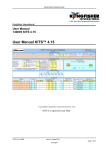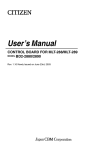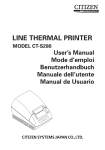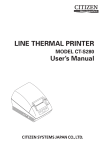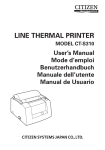Download Citizen BD2-3890 User`s manual
Transcript
User’s Manual CONTROL BOARD FOR MLT-388/MLT-389 MODEL BD2-3880/3890 Rev. 1.00 Newly Issued on October 22, 2004 REVISION Rev. No. 1.00 1.00 Date 2003.06.23 2004.10.22 Content Issued as first edition. “3.3 CN3 Connector for Interface” changed i CONTENTS 1. OUTLINE ....................................................................................................................... 1 1.1 Features ............................................................................................................................................................ 1 1.2 Precaution ......................................................................................................................................................... 1 2. BASIC SPECIFICATIONS .......................................................................................... 2 2.1 Model Classification ......................................................................................................................................... 2 2.2 Basic Specifications.......................................................................................................................................... 3 3. CONNECTING CONNECTORS................................................................................. 4 3.1 CN1 Connector for Printer Mechanism ............................................................................................................ 4 3.2 CN2 Connector for Print Mechanism ............................................................................................................... 5 3.3 CN3 Connector for Interface ............................................................................................................................ 6 3.4 CN201 Connector for Paper Cutter (Option) ................................................................................................... 7 4. SELECTING FUNCTIONS ......................................................................................... 8 5. POWER SUPPLY ........................................................................................................ 10 5.1 Specifications ................................................................................................................................................. 10 5.2 Precautions ..................................................................................................................................................... 10 6. PARALLEL INTERFACE .......................................................................................... 11 6.1 Specifications ................................................................................................................................................. 11 6.2 Explanation of Input/Output Signals .............................................................................................................. 11 6.3 Electrical Characteristics ................................................................................................................................ 12 6.4 Timing Chart (Compatibility Mode) .............................................................................................................. 13 6.5 Data Receiving Control .................................................................................................................................. 13 6.6 Buffering......................................................................................................................................................... 13 7. SERIAL INTERFACE ................................................................................................ 14 7.1 Specifications ................................................................................................................................................. 14 7.2 Explanation of Input/Output Signals .............................................................................................................. 15 7.3 Error Detection ............................................................................................................................................... 15 7.4 Data Receiving Control .................................................................................................................................. 16 7.5 Buffering......................................................................................................................................................... 16 7.6 Electrical Characteristics ................................................................................................................................ 16 ii 8. ERROR HANDLING .................................................................................................. 17 8.1 Peripheral Circuit Errors ................................................................................................................................ 17 8.2 Operation Errors ............................................................................................................................................. 18 8.3 Error Indication .............................................................................................................................................. 19 9. PRINTER MECHANISM CONTROL SYSTEM .................................................... 20 9.1 Thermal Head Control System ....................................................................................................................... 20 9.1.1 Fixed Division Number System ................................................................................................................ 20 9.1.2 Variable Division Number System ............................................................................................................ 20 9.2 Motor Drive .................................................................................................................................................... 21 9.2.1 Motor Drive Features ................................................................................................................................ 21 9.2.2 Maximum Motor Drive Speed at Major Voltage ....................................................................................... 21 10. MAINTENANCE AND SERVICE ........................................................................... 22 APPENDIX 1. BLOCK DIAGRAM .............................................................................. 23 APPENDIX 2. OUTER DIMENSION ........................................................................... 24 iii BD2-3880/3890 User’s Manual 1. OUTLINE This control boards is designed to be used to control our thermal printer, “MLT-388/389” series through the computer etc. As being provided with many abundant functions, it can be used widely in various applications. Before you start using it, read this manual thoroughly and understand the content. 1.1 Features (1) Ultra compact (2) Both interface of Serial and Parallel can be selected by dip switch. (3) Input buffer incorporated. (4) Bar code printing is available (dedicated command). (5) Auto paper cutter control incorporated (option). (6) User-defined character registration function (94 characters) (7) Low cost 1.2 Precaution (1) Make sure to turn OFF the power supply in case of connecting/disconnecting the connectors. (2) Absolutely do not make a short circuit between the terminals of connectors. (3) Use power supply, LED, interface, etc. following their specifications. (4) Use the recommended paper shown below. • Thermal Paper TF50KS-E2D (Nippon paper) KF50-HDA (Shin-Oji paper) F220VP (Mitsubishi paper) or the equivalent 1 BD2-3880/3890 User’s Manual 2. BASIC SPECIFICATIONS 2.1 Model Classification Models are identified by the following coding scheme: BD2 - 3890 U C Auto Cutter Drive C : With auto cutter function None : Without auto cutter function Character Set U : Internatiomal model Model Name of applied printer mechanism 3880 : For MLT-388 3890 : For MLT-389 Model Name * Printer model is specified by J8 (jumper). 2 BD2-3880/3890 User’s Manual 2.2 Basic Specifications Items Printing system Print width Print Speed Number of columns Character dimensions Character types Bar code type Line pitch Interface Input buffer Supply voltage Weight Outer Dimension Operating temperature and humidity Storage temperature and humidity Contents Thermosensitive dot-matrix printing 72 mm/576 dots 7.2V: Approx. 60 mm/s within 64 dots, at 35°C or more 5V: Approx. 30 mm/s within 64 dots, at 63°C or more Font A : 48 columns Font B : 64 columns Font A : 1.25 mm × 3.00 mm Font B : 0.88 mm × 3.00 mm Alphanumeric, international characters UPC-A/E, JAN (EAN) 13/8 columns, ITF, CODE 39, CODE128, CODABAR 4.23 mm (Can be changed by command) Serial (Conforms to RS-232C) or Parallel (Conforms to Centronics) (Selectable by dip switch) 2 K bytes Approx. 130 mA (At ANK slide printing) Logic part: 5V ±5% Drive unit: 4.2V ~ 8.5V Average: 1.5A (Peak: Approx. 4A) Operating votage is 7.2 V (Max) 8.5 V is a voltage only right after charging. 8.5V cannnot be used for normal voltage. Approx. 40 g 80 mm (W) × 90 mm (D) (For height of component parts, see outer drawing.) 5 ~ 40˚C , 35 ~ 85% RH (with no dew condensation) –20 ~ 60˚C , 10 ~ 90% RH (with no dew condensation) 3 BD2-3880/3890 User’s Manual 3. CONNECTING CONNECTORS 3.1 CN1 Connector for Printer Mechanism Pin No. Signal Name I/O Function 1 2 3 4 5 6 7 8 9 10 11 12 13 14 15 16 17 18 19 20 21 22 23 24 25 26 27 28 VH VH SI GND TM nSTRB 1 nSTRB 2 nSTRB 3 VDD nLATCH GND nSTRB 9 CP GND nSTRB 8 nSTRB 4 nSTRB 5 nSTRB 6 GND nSTRB 7 GND GND GND VH VH VH VH VH –– –– Output –– Input Output Output Output –– Output –– Output Output –– Output Output Output Output –– Output –– –– –– –– –– –– –– –– Power for print head Power for print head Head data output signal GND Thermistor Strobe 1 Strobe 2 Strobe 3 Thermal head logics power (+5V) Latch signal GND Strobe 9 Clock pulse GND Strobe 8 Strobe 4 Strobe 5 Strobe 6 GND Strobe 7 GND GND GND Power for print head Power for print head Power for print head Power for print head Power for print head Applicable Connector: 52806-2810 (Molex) * First “n” of signal name indicates “L” active signal. 4 BD2-3880/3890 User’s Manual 3.2 CN2 Connector for Print Mechanism Pin No. Signal Name I/O Function 1 2 3 4 5 6 7 MOTOR B MOTOR A MOTOR B MOTOR A PE C GND PE A Output Output Output Output Input –– –– 8 H-UP Input 9 GND –– Operation signal for motor B Operation signal for motor A Operation signal for motor B Operation signal for motor A Photointerruptor collector (Paper sensor) Photointerruptor emitter + cathode Photointerruptor anode (Paper sensor) Platen not mounted signal (MLT-389) Head-up signal (MLT-388) Head-up sensor GND Applicable Connector: 53047-0910 (Molex) 5 BD2-3880/3890 User’s Manual 3.3 CN3 Connector for Interface Pin No. Signal Name I/O Function 1 2 3 4 5 6 7 8 9 10 11 12 13 14 15 16 17 18 19 20 21 22 23 24 25 26 27 28 29 30 31 32 33 34 35 36 37 38 39 40 VDD VDD GND GND VP VP VP VP VP VP P-GND P-GND P-GND P-GND P-GND P-GND LF-SW ERROR PEout DTR TXD RXD DSR DATA0 DATA1 DATA2 DATA3 DATA4 DATA5 DATA6 DATA7 nSTB BUSY nFAULT SELECT PE nACK NC NC nRESET –– –– –– –– –– –– –– –– –– –– –– –– –– –– –– –– Input Output Output Output Output Input Input Input Input Input Input Input Input Input Input Input Output Output Output Output Output –– –– Input Power supply for circuit (5V) Power supply for circuit (5V) GND GND Power supply for operation Power supply for operation Power supply for operation Power supply for operation Power supply for operation Power supply for operation GND for operation GND for operation GND for operation GND for operation GND for operation GND for operation LF Switch input ERROR LED output (Can be connected directly) PE LED output (Can be connected directly) Serial Interface DTR Serial Interface TXD Serial Interface RXD Serial Interface DSR Parallel Interface DATA0 Parallel Interface DATA1 Parallel Interface DATA2 Parallel Interface DATA3 Parallel Interface DATA4 Parallel Interface DATA5 Parallel Interface DATA6 Parallel Interface DATA7 Parallel Interface nSTB Parallel Interface BUSY Parallel Interface nFAULT Parallel Interface SELECT Parallel Interface PE Parallel Interface nACK No Connection No Connection Parallel Interface nRESET Applicable Connector: 53313 - 4015 (Molex) * First “n” of signal name indicates “L” active signal. 6 BD2-3880/3890 User’s Manual CAUTION: 1. For LED of ERROR and PE, there is a resister of 330 Ω on the circuit side to make the current value 10 mA. Please use LED with a forward voltage of approx. 2V. LED exceeding 10 mA may break a control board. 2. Power supply for circuit (VDD and GND) requires feeding to only one pin. However, power supply for driver circuit (VP and P-GND) requires feeding to all pins to secure the capacity. 3. Serial interface equips a driver and receiver of RS-232C, make sure to use it at RS-232C level. 4. RESET terminal is pulled up by 47 KΩ. Make sure to make this terminal NC, when this terminal is not used. 5. LF-SW input circuit is as below. VDD CN3 47K CPU 17 Pin 1K 1000 pF 3.4 CN201 Connector for Paper Cutter (Option) Pin No. Signal Name I/O Function 1 2 3 4 M+ M– GND SW Output Output –– Input Cutter motor operational signal M + Cutter motor operational signal M – GND Cutter switch input signal Applicable Connector: 5267- 04A-X (Molex) CAUTION: Use the specified Paper Cutter (Model Name: ACS-230-5V). 7 BD2-3880/3890 User’s Manual 4. SELECTING FUNCTIONS DIP SWITCH OFF ON Factory Setting Pin No. Function 1-1 1-2 1-3 1-4 1-5 1-6 1-7 1-8 Auto Cutter CR Mode Print Density Communication Mode Enable Disable LF Enable LF Disable Combination with J-6. See Table (3) XON/XOFF DTR/DSR Baud Rate See Table (1) Pin No. Function OFF ON OFF OFF OFF OFF OFF OFF JUMPER J1 J2 J3 J4 J5 J6 J7 J8 Open Short Font Selection Factory Setting See Table (2) Paper Auto Loading Print Drive System Print Density (Supplementary) Not Used Mechanism Enable Variable division Disable Fixed division Combination with DS1-3 See Table (3) –– MLT-388 MLT-389 Open (*1) Open (*1) Open (*1) Short Short Short Short Short *1: All are short circuited for overseas type (BD2-38XX U). *2: When MLT-389 is used, J-4 is left unused and no auto loading occurs regardless of whether the jumper is short circuited or open. (1) Baud Rate DS1-8 DS1-7 DS1-6 DS1-5 Input Method Parity Baud Rate OFF OFF OFF OFF OFF OFF OFF OFF ON ON ON ON ON ON ON ON OFF OFF OFF OFF ON ON ON ON OFF OFF OFF OFF ON ON ON ON OFF OFF ON ON OFF OFF ON ON OFF OFF ON ON OFF OFF ON ON OFF ON OFF ON OFF ON OFF ON OFF ON OFF ON OFF ON OFF ON Parallel Input Serial Input –– None " " " " " " " " " " " " " " " " " " Odd –– 1200 bps 2400 bps 4800 bps 9600 bps 19200 bps 1200 bps 2400 bps 4800 bps 9600 bps 19200 bps 1200 bps 2400 bps 4800 bps 9600 bps 19200 bps 8 " " " " Even " " " " BD2-3880/3890 User’s Manual (2) Font Selection J-3 J-2 J-1 International Character Open Open Open Open Short Short Short Short Open Open Short Short Open Open Short Short Open Short Open Short Open Short Open Short Japan (JIS) Japan (Shift-JIS) Sweden Denmark 1 U.K. Germany France U.S.A DS3 J-6 Print Density Level Print Density Rate OFF OFF ON ON Open Short Open Short Light Standard Slightly Dark Dark 0 1 2 3 80% 100% 120% 150% (3) Print Density CAUTION: 1. Input Buffer is 2k byte. (Fixed) 2. Serial data length is 8 bits. (Fixed) 3. If print tone is set at 2 or above, printing rate tends to be lowered. 9 BD2-3880/3890 User’s Manual 5. POWER SUPPLY 5.1 Specifications VDD : 5V ±5% Approx. 130 mA VP : 4.2V ~ 8.5V Average: 1.5A (Peak: Approx. 4A) when 7.2V Operating votage is 7.2V (Max) 8.5V is a voltage only right after charging. 8.5V cannot be used for normal voltage. 5.2 Precautions (1) Design the product to supply power to VDD before VP when power is supplied to this control board. (2) Design the product to turn off the power for VDD after VP when power is turned off. (3) Make sure to turn off the power in case of connecting/disconnecting connectors. (4) Make sure to use VDD and VP following their specifications. (5) Make sure to use this control board connecting all of terminals between VP and P-GND. 10 BD2-3880/3890 User’s Manual 6. PARALLEL INTERFACE 6.1 Specifications Data input method : 8 bit parallel signal (DATA0~7) Control signals : nACK, BUSY, nSTB, nFAULT, PE, nRESET 6.2 Explanation of Input/Output Signals DATA0~7 : 8 bit parallel signal (Positive logic) nSTB : Strobe signal to read 8 bit data (Negative logic) nRESET : Signal to reset control board (Negative logic) nACK : 8 bit data request signal. Pulse signal output at the end of the BUSY signal (Negative logic) BUSY : Signal to indicate BUSY state of the printer. Input new data for “LOW” (Positive logic) nFAULT : Signal which is made “LOW” when printer is in alarm state. (Negative logic) In this case all the control logics within the printer stop functioning. PE : Signal which is output when paper runs out. (Positive logic) 11 BD2-3880/3890 User’s Manual 6.3 Electrical Characteristics (1) Input Signal Level “HIGH” level : 0.7 VDD MIN “LOW” level : 0.3 VDD MAX (2) Output Signal Level “HIGH” level : VDD - 0.1V MIN “LOW” level : 0.1V MAX (3) I/O Conditions nSTB, nRESET input signals are pulled up by 47 KΩ. Other input signals are pulled up by 50 KΩ. [Printer side] VDD [Host side] TWIST PAIR WIRE * First “n” of signal name indicates “L” active signal. [Host side] [Printer side] VDD TWIST PAIR WIRE All the output signals are pulled up by 50 KΩ. 12 BD2-3880/3890 User’s Manual 6.4 Timing Chart (Compatibility Mode) (1) Data Input and Printing Timing Power Supply DATA T2 nSTB T1 T3 T6 T4 BUSY nACK T5 T1, T2, T3 T4 T5 T6 : 0.5 µs (MIN) : 270 ns (MAX) : 2.3 µs (TYP) : 500 ms (MIN) *On supplying power 6.5 Data Receiving Control When BUSY signal is “LOW”, data from the host can be received. When it being “HIGH”, data cannot be received. 6.6 Buffering This control board incorporates 2K byte buffer. Therefore, big data can be buffered in input buffer, and the host side can be released immediately. 13 BD2-3880/3890 User’s Manual 7. SERIAL INTERFACE 7.1 Specifications (1) Data transfer system : Asynchronous (2) Baud rates 1200, 2400, 4800, 9600, 19200 bps (Selectable by user) (3) Configuration of one word Start bit : Data bit : Parity bit : Stop bit : 1 bit 8 bits Fixed Odd/Even or No parity (Selectable by user) 1 bit or more (4) Signal polarity RS-232C • Mark • Space Logic “1” (–3V ~ –12V) Logic “0” (+3V ~ +12V) = = (5) Receiving data (RD signal) RS-232C • Mark = 1 • Space = 0 (6) Receiving control (DTR signal) RS-232C • Mark : Data transfer is not available • Space : Data transfer is available (7) Transmission control (TD signal) DC1 code (11H) X-ON : Data reception is available DC3 code (13H) X-OFF : Data reception is not available 14 BD2-3880/3890 User’s Manual 7.2 Explanation of Input/Output Signals (1) RXD Serial receiving data signal. On occurrence of framing error, overrun error, or parity error, the data is printed as “?”. (2) DTR When this signal is READY, write data or a command. When they are written in BUSY, overrun error is occurred and data is ignored. Data can be written into the input buffer even when the printer is busy printing. A BUSY also occurs when the printer is powered on, in test print, in Online mode, or being reset. (3) TXD If data remaining in the printer’s input buffer is 256 bytes or less, the printer transfers a DC3 (13H: Data Receive Not Ready) signal to the host. If data in the input buffer exceeds 256 bytes, the printer transfers a DC1 (11H: Data Receive Ready) signal to the host. (4) GND Common GND on the circuit. 7.3 Error Detection Parity, framing, and overrun are detected. On detection of any error, the data are stored in the buffer as “?”. (1) Framing Error With “space” state having been detected on detection of a stop bit, error takes place. The data are stored in the buffer as “?”. (2) Parity Error With an error having been detected under specifying parity check, the data is stored in the buffer as “?”. (3) Overrun Error On detection of an overrun error, the data are stored in the buffer as “?”. 15 BD2-3880/3890 User’s Manual 7.4 Data Receiving Control When DTR/DSR control is selected, data from the host is received with DTR signal at “space” but not received with DTR signal at “Mark”. When XON/XOFF control is selected, data from the host is received after sending XON but cannot be received after sending XOFF. 7.5 Buffering Data transfer to the input buffer include DTR signals and TD signals as the control signals concerned. (1) DTR signals [See 7.2 (2)] (2) TXD signals [See 7.2 (3)] 7.6 Electrical Characteristics (1) RS-232C Circuit Input (RXD, DSR) <Printer side> <Host side> Equivalent MAX232 Output (DTR, TXD) <Printer side> <Host side> Equivalent MAX232 16 BD2-3880/3890 User’s Manual 8. ERROR HANDLING 8.1 Peripheral Circuit Errors These errors are detected at power-on or initialization just after a reset. (1) Error types Error Description Memory error Cutter error The CPU made a self-diagnosis of the circuit and detected an error with the external RAM. With the auto cutter enabled at the function selection terminal (DS1-1), the auto cutter (ACS-230-5V) is not connected to the cutter connector (CN201). (2) External signal outputs Connector for interface (CN3) Pin No. Signal Name 18 20 33 34 ERROR DTR BUSY nFAULT Remarks LED output. For a blinking pattern, see “8.3 Error Indication”. Serial interface Parallel interface Parallel interface * First “n” of signal name indicates “L” active signal. (3) Resetting methods Error Memory error Cutter error Resetting Method Unrecoverable After turning off the power, connect the auto cutter (ACS-230-5V) or turn off the function selection terminal (DS1-1) and turn on the power again. 17 BD2-3880/3890 User’s Manual 8.2 Operation Errors (1) Error types Error No paper Head-up Platen not mounted VP voltage error Head temperature error Cutter lock (ACS-230-5V) Description The printing paper set is not set. The head-up lever is at its up position. * When MLT-388 is used. * When MLT-389 is used. Platen is not mounted. A VP voltage is beyond its allowable range (4.2 to 8.5V) A head temperature is less than 0˚C or 65 ˚C or higher. When driving the cutter, the cutter is locked due to an external factor (Paper jam, etc.). CAUTION: The 8.5V upper-limit voltage for VP voltage error is only an assumptive voltage just after charging the battery when using the battery power. It cannot be normally used. A normal maximum voltage is 7.2V. (2) External signal outputs Connector for interface (CN3) Pin No. Signal Name 18 ERROR 19 20 33 36 34 PE out DTR BUSY PE nFAULT Remarks LED output. For a blinking pattern, see “8.3 Error Indication”. Output at error other than No-paper. LED output. This is always output at the time of no paper. Serial interface Parallel interface Parallel interface Parallel interface (3) Resetting methods Error Resetting Method No paper Head-up Platen not mounted VP voltage error Set the paper. See Note 1. Bring down the head-up lever. * When MLT-388 is used. * When MLT-389 is used. Mount the platen. Set to a voltage within the allowable range (4.2 to 8.5V) and turn on the power again. Alternatively, activate the Pin 17 (LF-SW) of the CN3 (interface connector). Head temperature At the lower limit (less than 0 C), printing becomes operational at 0 C higher. error At the upper limit (65 C or higher), it become operational at 60 C or lower. Cutter lock Eliminate paper jam and activate the Pin 17 (LF-SW) of the CN3 (interface (ACS-220-5V) connector) or turn on the power again. CAUTION: 1. When auto loading has not been selected with the function selection jumper (J4), set the paper manually. When it has been selected, the auto loading function is enabled to facilitate replacement of the paper. 2. The 8.5V upper-limit voltage for VP voltage error is only an assumptive voltage just after charging the battery when using the battery power. It cannot be normally used. A normal maximum voltage is 7.2V. 18 BD2-3880/3890 User’s Manual 8.3 Error Indication The errors other than no paper are indicated by a LED output (Illumination or blinking) of the Pin 18 (ERROR) of the CN3 (interface connector). Error Display Pattern Description Blinking cycle of 200 ms Memory error Blinking cycle of 150 ms (3 times) and 500 ms (1 time). Cutter lock (Cutter error) Head-up *MLT-388 Platen not mounted *MLT-389 Illuminated until reverted VP voltage error Illuminated until reverted Blinking cycle of 1 sec. Head temperature error Blinking cycle of 500 ms. Macro execution wait 19 BD2-3880/3890 User’s Manual 9. PRINTER MECHANISM CONTROL SYSTEM 9.1 Thermal Head Control System The MLT-388/MLT-389 (Line thermal printer) to be driven by this control board has a 576 dots/ line head divided into 9 blocks of 64 dots each. When actually driving the head, you can select either Fixed Division Number system, which drives the head, always dividing it into 9 blocks or Variable Division Number system which collectively drives several blocks at the time according to the number of activated head dots. For selection by function selection, refer to “4. Function Selection”. For selection by command, refer to attached “BD2-38XX Command Reference”. 9.1.1 Fixed Division Number System This system always drives each block in the same sequence. 1st Block 2nd Block 3rd Block 4th Block 64 Dots 64 Dots 64 Dots 64 Dots 1 Dot Line 5th Block 6th Block 7th Block 8th Block 9th Block 64 Dots 64 Dots 64 Dots 64 Dots 64 Dots 1st Step of Motor 2nd Step of Motor CAUTION: For a stepping motor driving method, see “9.2 Motor Drive”. 9.1.2 Variable Division Number System This system counts the number of printing dots for each block of the printing dot line and drives the blocks collective in such a manner not to exceed the maximum number of driving dots (64 dots). 1 Dot Line 1st Block 2nd Block 3rd Block 4th Block 5th Block 6th Block 7th Block 8th Block 9th Block 64 Dots 64 Dots 64 Dots 64 Dots 64 Dots 64 Dots 64 Dots 64 Dots 64 Dots 1st Step of Motor 2nd Step of Motor 20 BD2-3880/3890 User’s Manual 9.2 Motor Drive The MLT-388 and MLT-389 use a 4-phase bipolar stepping motor, which feeds paper by one dot line in two steps by 2-to-2 phase excitation. 9.2.1 Motor Drive Features 1) Drive at an optimum drive speed by the VP voltage. 2) Prevents heat generation of the motor by PWM control to restrain current consumption. 3) Provides acceleration control at the time of start. 9.2.2 Maximum Motor Drive Speed at Major Voltage VP Voltage 5V 6V 7.2V Motor Drive Speed 487 pps 702 pps 960 pps CAUTION: The maximum drive speed depends on the VP voltage. A printing speed may slightly differ depending on a processing time or voltage detection accuracy. During the course of printing, a motor drive speed may be slower than the maximum drive speed, depending on what is printed or the head divided drive system. 21 BD2-3880/3890 User’s Manual 10. MAINTENANCE AND SERVICE For the information on maintenance and service, please contact our dealer or at the following address. Northern America CBM America Corporation Service Center 363 Van Ness Way Suite 404 Torrance, CA 90501, U.S.A Other Areas Japan CBM Corporation Information Systems Division CBM Bldg., 5-68-10, Nakano Nakano-ku, Tokyo, 164-0001, Japan TEL 310-781-1460 FAX 310-781-9157 TEL FAX 03-5345-7440 03-5345-7441 22 BD2-3880/3890 User’s Manual APPENDIX 1. BLOCK DIAGRAM *Option Cutter CN201 FLASH MEMORY OSC RAM ROM Driver Dip switch Driver CN1 Timing Driver Reset VH CN3 Operation Panel Parallel (Centronics) Serial (RC-232C) VDD VP Power Supply VDD: 5V (Power suply for circuit) VP: 4.2 to 8.5V (Power suply for operation) Control CN2 Stepping Motor Paper End Head Up Platen Sensor * When MLT-388 is used: Head Up * When MLT-389 is used: Platen Sensor *1: Only for Japan 23 Print Head G/A CPU BD2-3880/3890 User’s Manual APPENDIX 2. OUTER DIMENSION φ3×4 BD2-38 IC1 IC2 CN1 80 72 CN3 TR2 TA1 IC6 TA2 TA2 CN2 CN201 4 4 82 90 (CN3) 12 TA201 CN201 IC101 1.6 3 (Unit: mm) 24




























